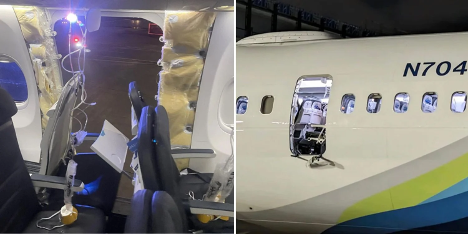
Seattle used to be a company town. One company. Boeing. The names were almost synonymous. But in 2001, under new leadership, the company relocated its headquarters to Chicago with the disingenuous explanation that it was closer to the big financial centers. In truth, it was a renegade takeover by executives from McDonnell Douglas, the financially troubled company Boeing had rescued and purchased three years earlier. It was a case of corporate sleight of hand. Overnight an aircraft manufacturing juggernaut was transformed into a financial services company slavishly pandering to Wall Street’s emphasis on shareholder value.
I grew up in Seattle. I worked at Boeing when I was in college. I flew three Boeing airplanes as a Pan Am pilot. Later on, I became friends with the Chief Administrative Officer, the Sr. VP for Manufacturing, the VP for Government and Community Relations and had a handshake relationship with the CEO of Commercial Airplanes (who, when he was passed over for CEO at Boeing, took the helm at Ford and saved it from bankruptcy). Boeing was a company town and Seattleites felt like stakeholders in its success.
But Boeing, like other companies had its ups and downs. In 1970 when the US economy tanked, its fortunes dipped and it was forced to lay off 60% of its workforce to survive. That was the year some wag purchased a billboard saying, “Will the last person leaving SEATTLE – Turn out the lights.”
But, the company did survive, rehired its employees and later that year delivered what is probably its greatest airplane—the 747.
But financial services companies do not know how to build airplanes.
When the company headquarters moved to Chicago, airplane manufacturing remained behind in Seattle, but its culture suffered. Morale dipped. Senior management nickel-dimed its unions and withdrew benefits. Parts were outsourced to China and Russia, and leaders were recruited from outside instead of promoted from within.
The new leadership team watched shareholder value climb. But financial wizardry can’t keep an airplane safe and in 2019 the wheels started to come off. And then a door flew off…
In 2019 and 2020, a runaway trim system caused two 737 MAX 8s to crash within a year. 349 passengers died. Then, in January of this year, an unsecured door plug on a Max 9 blew out the side of a flight departing Portland. Recently, other malfunctions including a Dutch Roll excursion drew attention to company failures. Then three whistleblowers came forward to inform the FAA concerning unresolved quality control issues. Now, Congress is investigating and criminal prosecution is possible.

On Monday David Calhoun, Boeing’s $33million a year, soon to retire CEO testified to the Senate Governmental Affairs Subcommittee on Investigations. It was not pretty. Senators from both sides recited a litany of company failures, malfeasance, criminal neglect, and retaliation against whistleblowers.
There are only two major airplane manufacturers in the world. Boeing has 5,700 airplane orders on the books for delivery in the next ten years, but in 2023 Airbus for the fifth consecutive year delivered more aircraft and landed more orders–a reflection of the aviation world’s concern with Boeing’s quality control and leadership problems.
And, it’s not just airplanes. Last week Boeing’s Starliner, America’s first rocket launch with astronauts since 2011, was canceled when a helium leak was detected. It was the Starliner’s third such cancelation this month. Elon Musk and Jeff Bezos have been launching private rockets for a decade and recovering them to use again. Why can’t Boeing do it?
Seattle is no longer a one company town. Microsoft, Amazon, Adobe, Starbucks, Costco, Nordstrom, Expedia and Alaska Airlines are all headquartered here, and we no longer worry about having to turn the lights out when the economy goes south. Boeing is still has a big presence here with 737 and 787 plants in Everett and Renton, but the bean counters continue to run things from Chicago.
Yesterday Jim Morris, the former Senior VP for Manufacturing, told me he thought “the management team now understands the importance of a highly engineered and high quality product.” He believes they will recover “but it will take several years.” I hope he’s right. I no longer have a stake in its success, but I hate to see what’s happened to one of America’s great companies. Boeing was founded in 1916 and was profitable for more than five decades because its dedicated engineers and line workers manufactured high quality state of the art aircraft. Those profits were not achieved by manipulating the stock price. Let’s hope the next generation of leaders knows more about building airplanes than fiddling with the balance sheet. Fingers crossed.
































Very nice summary: thanks for doing it. It’s so predictable yet awful to watch the demise of quality
I worked for a few years as an aeronautical engineer right out of college. My employer sent me to Boeing to attend a course in aircraft performance taught by Mr. Al Gunther. Engineers from all over the world came to attend this course. We were all so in awe of Boeing, the benchmark of engineering ingenuity not to mention the envy of the world. That was 40 years ago.
Fast forward to today. After putting so much lipstick on a pig known as the 737, it has since gained the reputation of a killing machine and a widow maker. Don’t get me wrong; the 737 was a fine aircraft when it first rolled out – 5 decades ago. The many poor transformations of the 737 over the years reflect a culture lacking ingenuity and innovation at the new Boeing.
The Boeing airplanes of the past, most notably the Queen of the Skies 747 and the sporty 757, remain my all time favorite airplanes. I avoided the 737 like a plague. Wouldn’t you when even the pilots who fly it nickname it the POS? And the 787, so-called the Dreamliner, is really just so so and far from a dream imho. The A350, made by the competitor Airbus, is superior in every aspect. How arrogant of Boeing to call their mediocre product the Dreamliner?
It’s that arrogance and the lack of ingenuity over the years that led to the downfall of a once venerable company.
Yes, shame on Boeing.